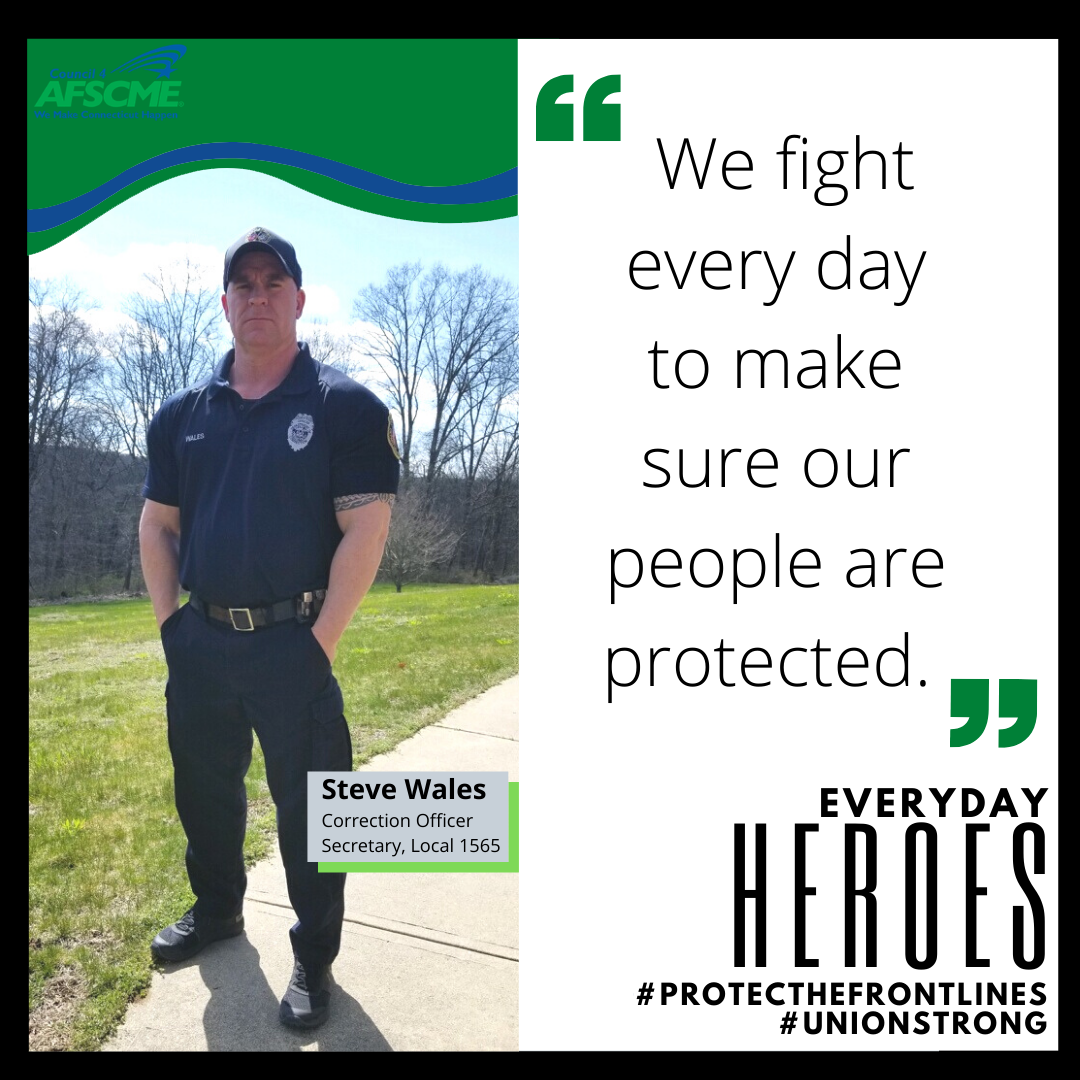It is a gross understatement to say Steven Wales of AFSCME Local 1565 (State. NP-4 Corrections) has a lot on his plate.
Correction Officer. Liaison. Husband. Spokesperson. Counselor. Teacher. Friend. Local Secretary. Father.
Working at the Corrigan-Radgowski Corrections Institute in Montville, Steven juggles multiple priorities – most of which have immediate and drastic consequences for his Local 1565 members due to the COVID-19 pandemic. And all occur behind closed walls that most people do not ever see.
Since the coronavirus crept into correctional facilities across the state, lessons have been learned and some progress has been made; however, the uphill battle continues. As of May 5, 338 correctional officers and 449 inmates had tested positive for COVID-19.
“What I’ve learned [from this crisis] is how unprepared a department could be,” said Wales, “but I’ve also learned how important it is for the union to stand up and fight. That’s what we’ve done for our members.”
Even as the number of COVID-positive corrections staff continued to climb, most were working without personal protective equipment (PPE) – including those in contact with inmates who were positive or symptomatic. After 6 weeks of waiting and pressuring the Department of Corrections (DOC) for PPE, the state finally delivered masks to corrections officers. At the Corrigan facility there remains a shortage of PPE for everyone.
“We’ve accomplished a lot to make the department do anything,” Wales said. “We are now able to walk around with an N-95 mask, a legitimate mask. Keep in mind [that at the beginning of the outbreak] they were handing out cloth masks and saying, ‘Ok, these are good.’”
Without union leaders diligently and persistently demanding proper safety equipment and improved protocols governing inmate movement and staff deployment, Wales believes DOC’s egregiously poor efforts to respond appropriately would have been further delayed.
“Without the unions I think they may have sat by for even longer,” Wales observed. “That is not to say that they don’t care, but I think the pressure made them act faster, even though they were still too slow to respond.”
Besides the lack of preparedness in safely protecting correction officers from the spread, DOC was inept at properly educating staff on how to interact with COVID-positive inmates. Although the training of officers does not fall within his job duties, Wales and his fellow Local 1565 Executive Board members stepped up to ensure staff were armed with the knowledge and tools to perform their work in a safe manner – a job he says should have been assigned to a supervisor.
The 19-year DOC veteran looks out for his fellow union sisters and brothers in other ways. Many see him as a confidant, and come to him for support. For correctional officers already working in a tough and dangerous environment, and at greater risk for PTSD, this camaraderie is significant during a pandemic seeped with anxieties and high stress.
“Allowing them to communicate or vent their frustrations is huge,” Wales observed.
After concluding a typical 16-hour shift, the ever-consuming heaviness and burden of dealing with the virus does not subside. Steven’s wife and kids have been in quarantine for weeks, yet the nature of his work in close quarters prevents them from being in contact with others, including their grandmother, who has COPD.
“I’m afraid of bringing this [virus] home,” he acknowledged. “I don’t need my family sick. I don’t need to see my kids sick from this. They’ve seen my mother through a glass window. They can’t spend time with their other grandparents. They can’t spend time with their friends. It’s been pretty bad.”
Wales acknowledges he is not the only one who endures this shared sacrifice. Other people at the facility are dealing with the same circumstances. But far from being worn down, Wales marches onward. He is courageous and determined. And he is bringing others along with him, leaving no one behind.
“The leadership of this union is fighting hard to make sure our people are protected. It’s very important to us,” he stressed. “I don’t want to see this happen to anybody. I don’t want to go to any funerals.”

